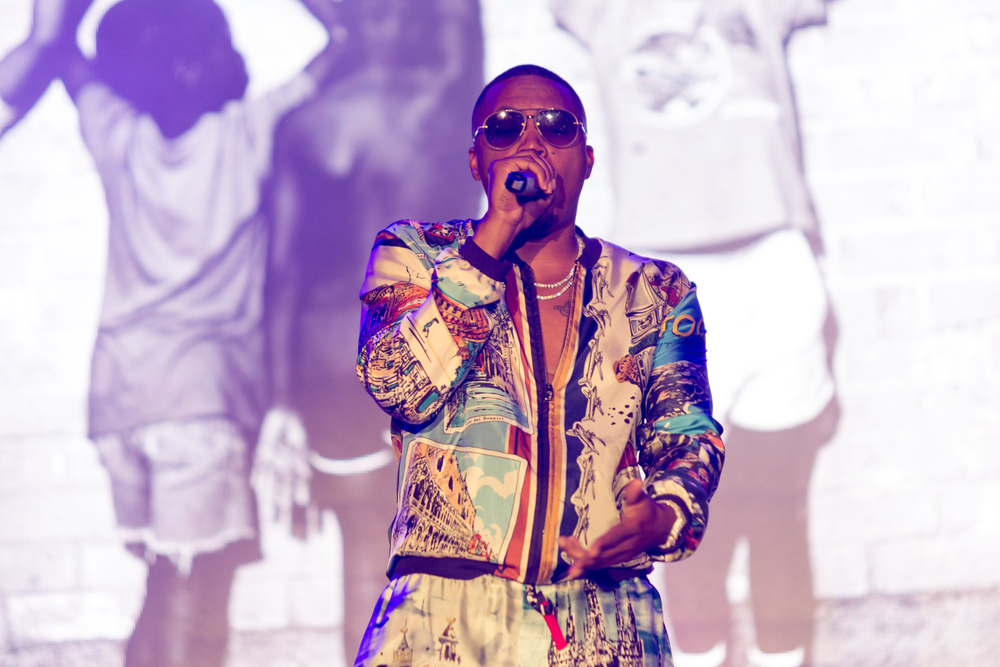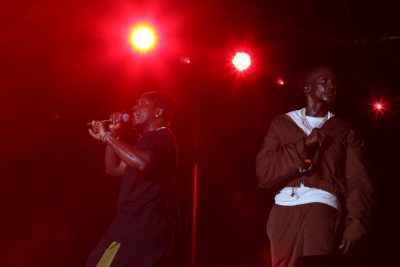Queens Legend Transforms Atlanta Stage Into Symphonic Masterpiece
The scorching July heat couldn’t dampen the electricity coursing through Atlanta’s Synovus Bank Amphitheater as hip-hop royalty Nas delivered a career-defining performance on July 5, 2023. Three decades after revolutionizing rap music, the Queens native proved that Illmatic remains as potent today as it was upon its April 1994 release.
The Queensbridge Virtuoso Takes Command
Nasir Jones emerged on stage dressed in pristine white attire, his hard-bottom shoes clicking against the floor as he approached the microphone. Despite temperatures soaring past 90 degrees, the artist known by various monikers—Nasty Nas, Escobar—appeared effortlessly composed. The symphony orchestra positioned behind him created an unexpected but harmonious backdrop for what would become an unforgettable evening.
The opening salvo came with “N.Y. State of Mind,” followed immediately by “Life’s a Bitch,” during which Nas acknowledged his longtime collaborator AZ. The crowd’s thunderous response indicated that this would be no ordinary concert but rather a celebration of hip-hop’s most revered album.
Bridging Generations Through Storytelling
As the evening progressed, Nas transitioned into “One Love,” pausing to educate audience members about the cultural references embedded within his lyrics. He explained MDC—the men’s detention center on Rikers Island—and its proximity to Queensbridge, the nation’s largest public housing development. This educational moment highlighted the geographical and social landscape that shaped his artistic vision.
The track itself tells the story of correspondence between friends separated by incarceration, a narrative that resonated powerfully with the diverse audience. Nas’ ability to transform personal experiences into universal themes demonstrated why his debut album continues to influence artists across genres.
Playful Moments Amid Serious Artistry
The performance wasn’t without its lighter moments. When introducing “It Ain’t Hard To Tell,” Nas playfully addressed the sampling controversy surrounding Michael Jackson’s “Human Nature.” Both his track and SWV’s “Right Here” utilized the same sample, prompting the rapper to joke about release dates while giving props to producer Teddy Riley and the R&B group.
These spontaneous interactions revealed Nas’ comfort with his legacy while maintaining the humble demeanor that has endeared him to fans throughout his career.
A Catalog Spanning Decades
Rather than limiting himself to Illmatic tracks, Nas curated a setlist that showcased his artistic evolution. Songs from It Was Written including “If I Ruled The World” and “Street Dreams” demonstrated his commercial appeal, while cuts like “Hate Me Now” and “Nas Is Like” from I Am proved his ability to adapt to changing musical landscapes.
The audience participation reached its peak during “Made You Look,” with fans reciting every word alongside the performer. This collective energy underscored the intergenerational appeal of Nas’ music and its continued relevance in contemporary hip-hop culture.
Business Acumen Beyond the Booth
At 51, Nas has evolved far beyond his origins as a teenage rapper from Queens. His strategic investments and business ventures have transformed him into a multimillionaire entrepreneur, proving that artistic integrity and commercial success aren’t mutually exclusive. This evolution reflects hip-hop’s own maturation as both an art form and economic force.
His maintained relevance in an industry notorious for discarding aging artists speaks to both his artistic consistency and business intelligence. The cool confidence he displayed throughout the Atlanta performance reflected someone comfortable with his achievements while remaining hungry for new challenges.
The Power of One Mic
As the evening concluded, Nas returned to his roots with “One Mic,” the track that originally closed many of his early performances. The circular nature of this choice—beginning and ending with raw, unfiltered artistry—perfectly encapsulated the evening’s theme of celebrating growth while honoring origins.
The symphony orchestra’s final notes lingered in the humid Atlanta air as fans slowly departed, carrying with them the memory of witnessing hip-hop history. Nas had accomplished something remarkable: transforming a nostalgic celebration into a statement about hip-hop’s enduring power and his own unwavering relevance.
This wasn’t merely a concert but a cultural moment that reinforced why Illmatic remains the gold standard for rap albums three decades after its release. In an era of constant musical innovation, Nas proved that true artistry transcends temporal boundaries.















